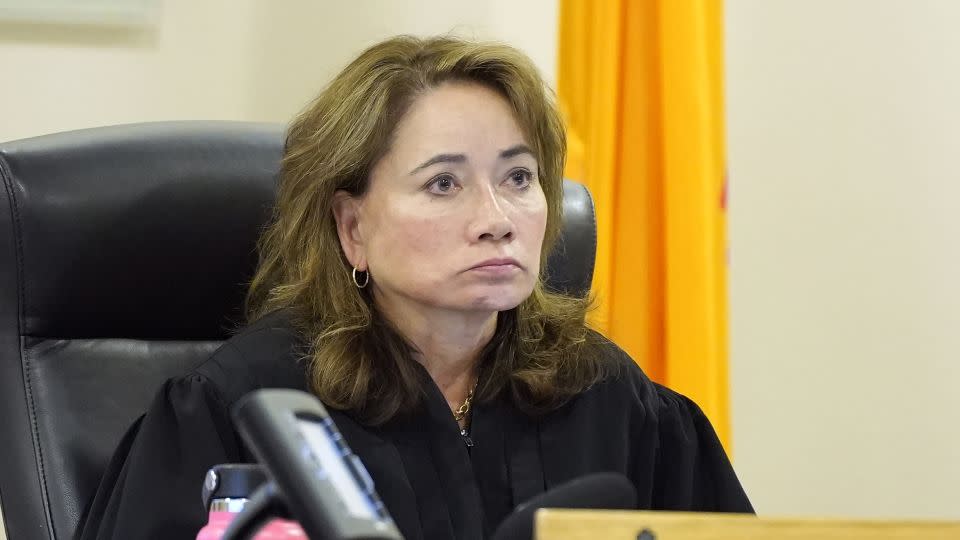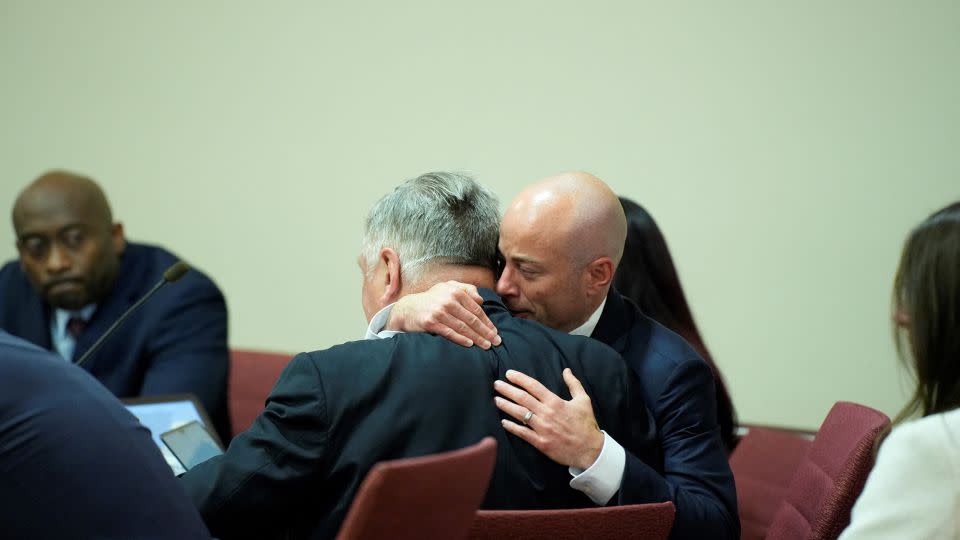‘Rust’ movie set shooting trial: Why the involuntary manslaughter case against actor Alec Baldwin was dismissed
- Oops!Something went wrong.Please try again later.
- Oops!Something went wrong.Please try again later.
Two days after Alec Baldwin’s involuntary manslaughter trial began and nearly three years after the fatal “Rust” movie set shooting that led to the charge against him, a New Mexico judge said eight words that left the actor visibly emotional – and marked the trial’s end.
“Your motion to dismiss with prejudice is granted,” Judge Mary Marlowe Sommer told Baldwin and his legal team in court on Friday afternoon, prompting an already shaking Baldwin to remove his glasses and sob into his hand before embracing his wife, Hilaria.
The ruling concluded nearly three years of back-and-forth legal arguments and turnover in prosecutors leading up to the trial against Baldwin, who faced up to 18 months in prison and a $5,000 fine related to the October 2021 fatal shooting death of cinematographer Halyna Hutchins on the set of the Western film, “Rust.”
At the time of the shooting on October 21, 2021, Baldwin was practicing a “cross draw,” pulling a gun from a holster on the side of his body opposite to his draw hand, with a prop gun at a church on the film’s New Mexico set when it fired a live round, killing Hutchins and injuring “Rust” director Joel Souza.
On Thursday, Baldwin’s defense team filed a motion to dismiss the case stating the prosecutors concealed evidence “potentially pointing to an external source of the live ammunition (prop supplier Seth Kenney) because the evidence would be favorable to Baldwin,” court documents show.
On Friday, following a chaotic hearing that involved one special prosecutor taking the stand as a witness and another special prosecutor – Erlinda Johnson – resigning from the prosecution team that day, Marlowe Sommer sided with the defense as a result of the evidence issue first brought to light Thursday and granted the motion to dismiss with prejudice, meaning the case cannot be brought again.
Baldwin thanked his supporters via an Instagram post Saturday in his first public comments since the charge against him was dropped.
“There are too many people who have supported me to thank just now,” the actor wrote in a post which included a photo taken of him during the trial earlier this week.
Baldwin added: “To all of you, you will never know how much I appreciate your kindness toward my family.”
Special prosecutor Kari Morrissey, who on Friday answered questions under oath from defense attorney Alex Spiro, said she was disappointed by the dismissal.
“I believe that the importance of the evidence was misconstrued by the defense attorneys, but I have to respect the court’s decision,” Morrissey said following court Friday.
Here’s what led to the dismissal in the Baldwin case.

Defense accuses prosecution of suppressing evidence
Marlowe Sommer, who had been adamant about keeping the trial on schedule, was noticeably perturbed early Friday when she halted testimony in the case and dismissed the jury so she could take up Baldwin’s motion to throw out his criminal charge.
Ahead of her ruling Friday, the judge referred to a dismissal with prejudice as a “very extreme sanction” that would require her to go through each element of the motion and “make a very good record as to why I’m seeing what I’m seeing,” she said.
Baldwin’s team argued state investigators did not properly share with the defense that a man had delivered a box of ammunition purportedly connected to the case to investigators.
In its motion, the defense claimed the state “unilaterally withheld” evidence that could be favorable to Baldwin’s trial, which is a violation of the Brady rule, named after the 1963 Brady v. Maryland case. The rule requires prosecutors “to disclose material, exculpatory information in the government’s possession to the defense,” according to Cornell Law School.
In order to establish a Brady violation, Marlowe Sommer explained Friday, the defendant has to show “the prosecution suppressed evidence, the evidence was favorable to the accused and the evidence was material to the defense.”
The defense claimed Baldwin was unaware of the risk live ammunition had been brought to the “Rust” set.
For the state’s prosecutors to establish a link between Baldwin and the live ammunition source, they would have to show Hannah Gutierrez-Reed, the armorer for “Rust” who in March was found guilty of involuntary manslaughter and sentenced to 18 months in prison, had brought the rounds to set, according the motion filed Thursday.
“Evidence that the live rounds came from Kenney is therefore favorable to Baldwin, which is why the State buried it,” the document states.
In court Thursday, crime scene technician Marissa Poppell testified retired police officer Troy Teske had delivered a box of ammunition to the Santa Fe County Sheriff’s Office in March after Gutierrez-Reed’s conviction, CNN previously reported.
Teske, who was a friend of the armorer’s father, told investigators he thought the ammunition could be associated with the “Rust” incident, according to Poppell.
The items, however, were cataloged separately from Baldwin’s case, excluded from the “Rust” case inventory and not tested to see if they matched the lethal round, according to Poppell’s testimony.
Marlowe Sommer said on Friday the suppression-of-evidence element of proving a Brady element was satisfied. “The Santa Fe County Sheriff’s Office and the prosecution failed to disclose the supplemental report to defense and provide defense an opportunity to inspect the rounds collected into evidence that Mr. Teske gave,” the judge said.
Judge: ‘No way for the court to right this wrong’
The second Brady element Marlowe Sommer broke down is whether the evidence suppressed by prosecutors was favorable to Baldwin, “either as impeachment or exculpatory evidence,” she said.
“This prong is satisfied. The suppressed evidence is favorable to the accused,” the judge said. “It is impeachment evidence, has even been offered in this trial as impeachment evidence and is potentially exculpatory to the defense.”
Marlowe Sommer added the evidence’s exculpatory value couldn’t be analyzed at such a late point in time due to the nondisclosure. She next examined whether the suppressed evidence was material to the case, which she concluded it was.

“The late discovery of this evidence during trial has impeded the effective use of evidence in such a way that it has impacted the fundamental fairness of the proceedings,” Marlowe Sommer said, adding Baldwin’s defense wasn’t in a position to test the prosecution’s theory regarding the source of the live rounds that killed Hutchins.
The judge said the state failed to provide the discovery to Baldwin’s defense team, referring to the prosecutor’s withholding of the information as “intentional and deliberate.”
Marlowe Sommer said: “If this conduct does not rise to the level of bad faith, it certainly comes so near to bad faith as to show signs of scorching.”
The judge also agreed the late evidence was “highly prejudicial” to Baldwin’s case.
“The jury has been sworn, jeopardy has attached, and this disclosure during the course of trial is so late that it undermines the defendant’s preparation for trial,” Marlowe Sommer said. “There is no way for the court to right this wrong.”
The judge added just before granting the motion to dismiss the case: “The state’s discovery violation has injected a needless, incurable delay into the jury trial. Dismissal with prejudice is warranted to ensure the integrity of the judicial system and the efficient administration of justice.”
Gutierrez-Reed’s attorney, Jason Bowles, said he will move to dismiss her case following Baldwin’s case dismissal.
“The judge found intentional misconduct and we also have had the same failures in Hannah’s case, by the State,” Bowles said.
Attorney Gloria Allred, who is representing Hutchins’s parents and sister, said during a Saturday news conference, “it may be a little premature for Alec Baldwin to be having his party.”
Allred said plans to launch a civil case against Baldwin would proceed.
“We are going to fight to the end for Halyna Hutchins,” Allred said, adding she hopes the district attorney’s office in Santa Fe decides to appeal Friday’s ruling.
“But I would point out, this was not our case,” Allred said. “Now it will be our case, the civil case, so we have more control of what happens in this case, and we have more power to work to move it forward.”
CNN’s Julia Vargas Jones and Jack Hannah contributed to this report.
For more CNN news and newsletters create an account at CNN.com

